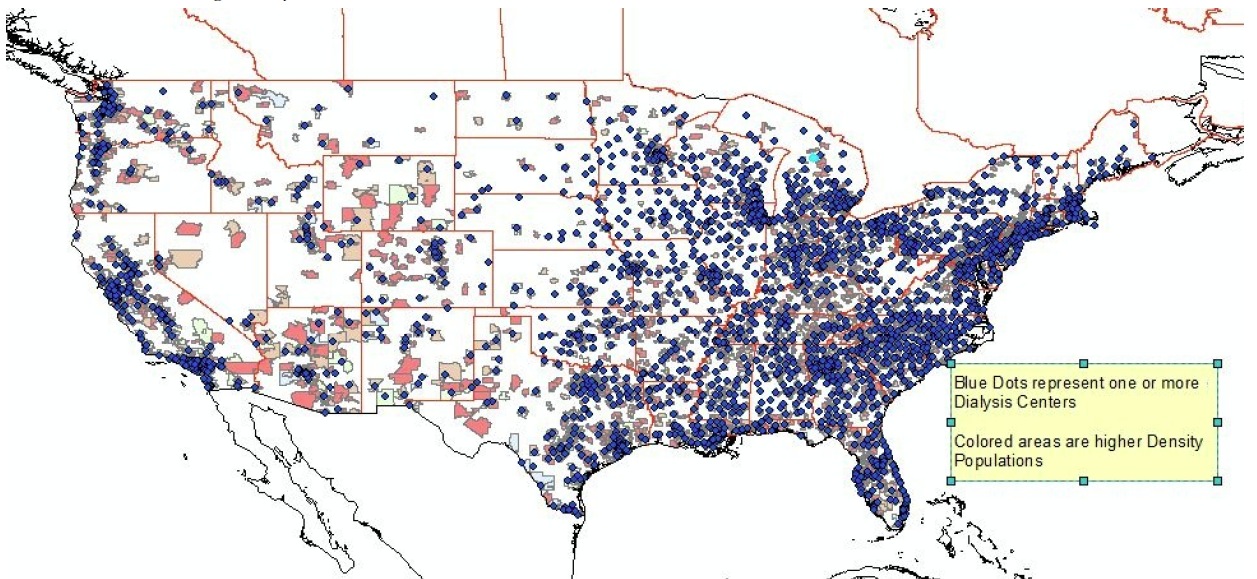COMMUNITY TRANSPORTATION ASSOCIATION
Everyday, thousands of Americans who need regular kidney dialysis board a community or public transit vehicle to access this life-sustaining care. The trips these patients take are time-consuming — they often last more than four hours in duration — and essential, as they absolutely must be made, regardless of the weather or any other circumstances. Dialysis trips also are changing the nature of public transit in many communities.
The role of providing transportation for dialysis treatment has long been an area of challenge — as well as accomplishment — for community, public and human services transportation. Early outpatient dialysis treatment created significant needs for demand-responsive transportation services xin communities of all sizes. Since, initially, many of the clinics providing dialysis were located in urban areas, transportation in rural communities took on greater importance for patients and their families. In the ensuing years, the growth in the overall number of dialysis patients brought increased needs for responsive mobility services in urban and suburban areas, too.
The regular and consistent need for dialysis treatment requires similar consistency in transportation access. Paratransit services, rural public transit, human service networks and volunteer programs not only provided many of these life-sustaining trips, but also raised funds to support them. Although public funding helped with purchasing equipment or even operating costs, many programs needed to raise local funds to meet various match requirements or to meet the needs of individuals that didn’t fit into some categorical program or individual eligibility requirement. In one of the greatest and often undisclosed success story, these transportation providers and networks made dialysis treatment possible for millions of Americans — and changed many people’s lives.
Over the last 30 years, dialysis transportation services have made it possible for patients to stay in their homes and in their communities, thus greatly lowering the overall cost of providing the treatment. And although these efforts stretched the resources and ingenuity of the nation’s transportation services — the need for dialysis transportation was met day in
and day-out across the nation.
The significant growth of dialysis treatment — as is detailed later in this report — makes daunting the prospect of continuing to meet the demand under the current structure. It seems that one of our nation’s greatest medical challenges is equally a test of our transportation system. Across the nation those who created the current dialysis mobility solutions are faced with dramatic increases in demand as the number of dialysis patients and the number of clinics — which often work on a 24-hour basis to serve more patients — require both additional resources and tools. Because there are many patients needing evening services and since many patients experience difficulties with treatment, there are now needs for more individualized dialysis transportation service strategies that are more expensive to provide. For community and public transit operators, these trips are a mounting challenge.
Demand for dialysis transportation, according to every transit manager interviewed for this article, is skyrocketing at the same time payment mechanisms dwindle. Trips distances have grown even as available dialysis center chairs are expanded locally to keep up with the number of patients. What is needed today, clearly, are new solutions, new partnerships and new thinking. “We’ve reached the tipping point,” says Santo Grande Executive Director of Delmarva Community Transit, headquartered in Maryland’s rural Eastern Shore. “We just don’t have the resources to meet the need — vehicles, drivers and money.”

Download full report (PDF): The Dialysis Report: Transportation Demand Outstrips Supply
About the Community Transportation Association
web1.ctaa.org
“Our vision of America’s public and community transportation future — the cause that we serve — is based upon fundamental values that are as old as the nation itself.
Freedom, independence, dignity and choice are as much at the heart of the debate for building an accessible society as they have been in building a free society. There is never an end to the work to create a free society, and there will never be an end to our work to build a more mobile society. Both of these noble pursuits remain great works in progress.”






 RSS Feed
RSS Feed